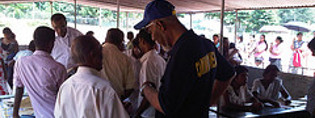Sri Lanka (MNN) — Sri Lanka is
on edge after its presidential election. The nation's incumbent president Mahinda Rajapakse declared victory in
his race for a second term Wednesday. However, his main challenger, Sarath Fonseka, is
contesting the results.
Once allies, the contest pitted
Rajapakse as commander-in-chief, and Fonseka–his now estranged army chief–against each another. Working as a
team, they defeated the Tamil Tigers in May last year, ending a separatist
conflict that left 80,000-100,000 dead.
Without the war, cracks emerged
in the alliance. Personal animosity
between them fueled the campaign's vicious nature, and the accusations
flew. The verbal attacks fueled concerns
over unrest should the results be contested.
Leadership transition is always
tricky. Which leader will be better for
the purposes of the Gospel? We asked Todd Nettleton with Voice
of the Martyrs what Christians might expect from a leader whose
style they already know. That, too, is
an unknown. "He (Rajapakse) has talked a lot about economic development. He has not talked, that I have seen, a lot
about religious freedom. So, it will be interesting to see if that does become
part of his platform moving forward."
For example, a controversial
anti-conversion bill is in the works in Parliament. Nettleton says Parliament deferred the bill's
debate last spring. Was that due to the
election? Nettleton explains that
between the end of the war with the Tamils and the recovery from natural
disaster, the government's hands were quite full.
The bill will be up for discussion
again, but that will likely occur after changes are made to make it fall under Sri
Lanka's constitution. Sri Lanka's
constitution guarantees freedom of thought, conscience and religion, although
it also calls for Buddhism to hold the "foremost place."
However, the proposed
legislation, titled "Bill for Prohibition of Forcible Conversions," calls
for penalties including fines up 500,000 Sri Lankan rupees ($4,425) and/or
seven years in prison for anyone who tries to convert a Sri Lankan citizen from
one religion to another by using force, fraud or allurement. The harshest
punishments are reserved for those convicted of converting women or children.
The Jathika Hela Urumaya
political party, whose leadership is comprised of Buddhist monks, drafted it. A
leader of that party is on record as saying that U.S.- funded Christian missionaries
are one of the greatest threats facing Sri Lanka.
Nettleton says the question is, "Will
they try to protect the freedom of Christians to witness for Christ and the
freedom of other people to choose to become Christians and follow Christ? Will they join in that pressure through an
anti-conversion law, or through other ways of pressuring the church not to be
reaching out and not to be presenting the Gospel?"
It's one more reason to pray for boldness for Christians and wisdom for the leaders. Ask the Lord to work in the
hearts of those targeting Sri Lankan believers so that they will repent and
come to faith in Him. Pray that Christians in Sri Lanka will continue to share
the news of God's grace.

